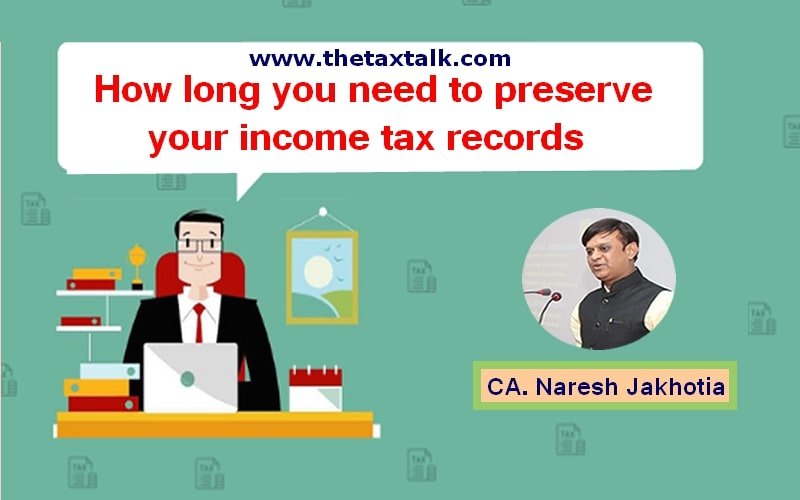![]()
How long you need to preserve your income tax records
The minute you throw something out that you haven’t looked at or touched for decades, you will need it desperately- Universally accepted human law
With e-filing applicable to almost every taxpayer, documents are not required to be attached or uploaded along with the income tax return. The Income Tax Department can demand records & evidence not only for the current year but also for earlier years. This may include documents in support of basic deduction like u/s 80C, 80D, 80G to documents relating to agricultural income, expenses, etc. Not only businessmen & professionals, even salaried taxpayers are not immune from the requirements of preserving the records. Taxpayers are duty bound to preserve old documents & records in support of their income. How long a taxpayer should preserve the documents is one of the most vital questions by the taxpayers.
There is no specific clause in the Income Tax Act as to the time limit for retaining the records by salaried taxpayers & businessmen. However, the same has to be inferred from the power of authorities with regard to assessment & calling of information thereof. Section 149 of the Income Tax Act empowers the income tax authorities to demand the records and documents of earlier years from the taxpayers for their inspection and verification. However, this power is not blanket power & there is a fixed time period for which the documents & records can be called for. These restrictions in the power to call for records of earlier years can be considered as the time limit for which taxpayers must preserve the books of accounts and records.
In normal course, Income tax authorities have powers to issue notices for assessing income of the taxpayers up to three assessment years from the end of the relevant assessment years. For example, for FY 2020-21 (AY: 2021-22), records are required to be retained till 31.03.2024. In short, no documents & records for the period prior to 31/03/2018 can be called for after 01/04/2021 onwards. This period of 3 years is applicable to all the classes of taxpayers, be it individual, firm, trust or a company.
However, in case the income escaping assessment exceeds or likely to exceed Rs. 50 Lakh or more then the Income tax authorities have powers to issue notices for assessing income of the taxpayers up to ten assessment years from the end of the relevant Assessment year. This extended period of 10 years shall be applicable only if the Assessing Officer has in his possession books of account or other documents or evidence which reveal that the income chargeable to tax is represented in the form of asset and income is likely to amount to Rs. 50 lakhs or more for that year. For example, for FY 2020-21 (AY: 2021-22), records are required to be retained till 31.03.2032 by all such taxpayers where there are the chances of undisclosed income represented by an assets of Rs. 50 Lakh or more. In short, the taxpayers falling under this category are not required to maintain the records & documents for the period prior to 31/03/2011. Only documents and records for the FY 2011-12 and onwards would be relevant in the current FY.
Earlier, any individual having income relating to a foreign asset or having a financial interest in any foreign entity, then such related documents were required to be kept for 16 years from the end of the relevant assessment years. However, this provision of 16 years for foreign assets has now been scrapped.
Even those taxpayers who are not filing income tax return are also required to preserve the documents for 3 years or 10 years so as to justify that there was no obligation to file the return or there is no escapement of income on their part.
However there are three exceptions to above provisions:
- Where the taxpayers have filed an appeal against any assessment order of any year, then the books of accounts of that year should be preserved until the final decision of such appeal.
- Where the assessment in relation to any Year has been reopened u/s 147 within time u/s 149, then in such case all the books of account and documents shall continue to be kept till the assessment so reopened has been completed.
- Where theperson who has entered into an International or specified domestic transaction then the records of 8 years are required to be maintained.
Though not mandatory, it is advisable for the Taxpayers to preserve the documents/records even beyond the normal period of 3 years or 10 years in following cases:
1. Investment/Expenses documents related to construction, renovation, major repairs etc over the property must be kept forever. These may be required for calculation of capital gain whenever such property is sold at a later date. It is advisable to keep one file each for expenses incurred over the property.
- Bills of Gems, Jewellery, ornaments, Silver & other assets along with documentary evidence proving its source of investment must be kept permanently. In case of travel, theft, gift, etc, it can be of high relevance.
- Documents & records of Loans & Advances given by the taxpayer to anyone must be kept by the taxpayers till the amount is received back. In absence of the records & documents of loan being given in earlier years, the recovered amount may be brought to tax again by the tax authorities.
[Readers may forward their feedback & queries at nareshjakhotia@gmail.com. Other articles & response to queries are available at www.theTAXtalk.com]

